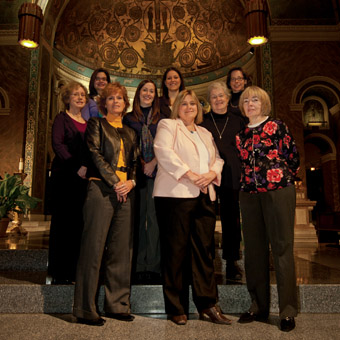How women who work for the church keep the faith
It’s lunchtime at St. Clement Parish in Chicago, and although some of the city’s best restaurants are within walking distance, most of the staff members instead opt for microwaved leftovers and conversation with colleagues around the conference table. The building engineer and associate pastor stop by for a quick bite, but otherwise this makeshift lunchroom is Estrogen Central.
A large parish of 4,000 mostly middle- and upper-class families, St. Clement boasts 12 full-time, well-educated lay employees. Only two are men.
St. Clement is a great place to be a woman in the church. The pastor is open and collaborative. Women are visible in leadership and liturgy, and they are accepted and respected by parishioners. Older women mentor the younger ones. And the flexible hours, reasonable salaries, and decent benefits make it possible for women to do the meaningful work they were trained and feel called to do.
“I never thought I could love a job this much,” says Flo Merkl-Deutsch, a St. Clement parishioner for 16 years and coordinator of liturgy for four. “There’s a sense of possibility here. My opinions are welcomed and respected. And as a working mom, it’s a dream job.”
Heads nod around the conference table. “I feel valued and trusted to do my job,” says Christina Bax, who is in her first full-time ministry position as pastoral associate and director of evangelization. “I can count on one hand the times a parishioner has said, ‘I’m going to check with Father.’ ”
Even Erin Neal, a part-time assistant to the catechesis program by day and actress by night, says working at the parish has been her favorite job “of all the jobs I’ve ever had—outside of the theater.”
Women virtually run the church in the United States. They make up the majority of parishioners, volunteers, and staff at the parish level, and make up at least half of employees at most diocesan offices. A third of Catholic students pursuing advanced theological degrees are women—and most plan to use their education in service to the church.
Today Catholic women serve as everything from chancellors, chief financial officers, and diocesan newspaper editors to directors of religious education, youth ministers, and volunteers for every manner of committee, ministry, or charitable project imaginable. And in the position of parish secretary, they sometimes wield more power than the pastor.
But news reports and the stories of some women in the Catholic Church highlight the continuing conflict around women’s issues: threats of or actual firings, language that seems to exclude women, lack of respect from clergy and/or laity, and salaries and benefits that are anything but family-friendly. And although Pope John Paul II, in his 1994 apostolic letter Ordinatio sacerdotalis, said that restricting ordination to men alone is to be held definitively by the faithful, it remains a stumbling block for many Catholic women who continue to disagree with it.
While many Catholic women see no problems with their place in the church, others leave Catholicism to find what they consider more female-friendly faith communities elsewhere. Still others stay, working within what they see as the church’s limitations but vowing to improve it.
Catholic women who work or volunteer for the church sometimes struggle with an added dilemma: How do they reconcile their practice of ministry and their dependence on the church for their livelihood with their concerns about the role of women in the church?
“It’s very challenging for me personally to be a woman in the Catholic Church,” says Mary DuQuaine, who jokingly calls herself a “lifer” because of her 25 years of volunteer and professional ministry experience.
While she loves her job as director of catechesis and feels respected by the priests and parishioners at St. Clement, not all of her experiences have been this positive. She declines to give details, but she doesn’t believe women’s voices are always heard by the hierarchy and wishes women could serve in more primary liturgical roles.
Still, she recognizes that in her role as a catechist she represents the institutional church. “When we accept a position like this, we’re being paid to represent the church’s teaching. You accept those terms,” she says. “But there is some dissonance.”
DuQuaine stands up for what she believes in, but she doesn’t see herself as an agitator. “That’s putting yourself in a painful position,” she says. “You’re not going to be successful in your ministry if you’re angry all the time.”
The long view
Other veterans who have worked for the church for decades agree, advising younger women to go in with their eyes open and their frustration checked at the door if they want to work in ministry.
“I would encourage someone who had a call to follow her heart,” says Diane Vella, who has worked in parish and diocesan ministry for 30 years in the Diocese of Rockville Centre, New York. “That being said, I would be very honest with them about the pitfalls and the struggles.”
As a teenager in the 1970s, Vella was inspired by her dynamic parish to study theology in college and work in parish ministry to “try to have the impact on people that my role models had on me.” As part of the second generation of women moving into ministry, Vella had it easy compared to the first wave of female parish employees, often former volunteers whose children had grown.
Ann Ruggaber was one of those moms who had volunteered to teach CCD classes and then went on to get a master’s degree and work in parish ministry for almost 30 years. “I had a lot of resistance in the beginning,” she recalls. “I didn’t feel very accepted.”
Men in similar positions got instant respect, even if they weren’t ordained, Ruggaber recalls. And when she went to graduate school, she not only had to pay her own tuition but also wasn’t allowed to attend classes on work time.
She became frustrated when pastoral counseling sessions had to end with her finding a priest to complete the sacrament of reconciliation. “I walked with these people; I should be able to do this,” she remembers thinking.
But Ruggaber takes a long view, seeing her role as paving the way for women to take fuller leadership roles in the church. “I’m at peace that this is my call—to prepare the church in my tiny way for women being pastors,” she says.
That peace came from an acceptance that Vella also has found to be key to survival and happiness in church ministry. “By going into professional ministry in the Roman Catholic Church, I—and others like me—have accepted the fact that there is a difference between what I can do as a woman and what a man could do,” Vella says.
But now, after three decades in parish and diocesan work, she feels an uneasiness for women in ministry—not only because of a perceived shift toward a more conservative theological outlook but because of growing financial constraints on parishes. “Your budget is a theological statement,” says Vella, who wonders if her next pastor will value adult education as much as the current one. “I think there are fewer clergy who are supportive of and open to the role of lay professional ministers in the church.”
And she’s afraid that the current expectation that church employees strictly adhere to all church teachings, especially on controversial issues, probably scares some younger women from working for the church.
When the Diocese of Long Island offered fairly generous voluntary separation packages as a cost-cutting measure, a number of women in parish ministry took them. Vella didn’t, but don’t think she didn’t give it a thought. Given the current trends and an upcoming pastor change, “I am concerned about the viability of staying in ministry for the next 15 years until retirement,” she says.
Occupational hazards
Recent news stories have reported the firings of women who have publicly supported inclusive language, women’s ordination, or other hot-button issues.
Other realities are less newsworthy but still real. Female seminary students are more likely to take out loans to pay their tuition while their clerical counterparts get a free ride. Deacons’ wives complete training comparable to or the same as their husbands’ only to receive a rose rather than ordination. A long-time female employee finds herself pushed out to make room for a new employee with a collar—sometimes a deacon with substantially less parish experience.
But by far the most common concern for women working in the church is a new pastor. Parish employees—as many as 80 percent of whom are women—know they are only a personnel change away from the unemployment line. Talk to a handful of female lay ministers and at least one will tell how she was unfairly fired or forced out by a new pastor with a new—or often old—vision and different priorities.
That’s what happened to Sharon Smith (whose name has been changed at her request), who coordinated an intergenerational faith formation program at an Illinois parish. She had left a six-figure career in the corporate world, in part because she was disenchanted with its lack of ethics, to study theology and pursue her dream of working in ministry.
Everything was fine until the pastor who hired her retired. The new priest, she says, was “dictatorial,” sent vitriolic emails in the middle of the night, and was disrespectful to everyone—especially the female employees.
“I’ll never work in a parish again,” says Smith. “The pastor has absolute power. I was always thinking about how to placate this guy. The mission stopped driving my ministry, and I was disturbed that I was constantly being asked to compromise my integrity.”
Other women are swept out in broader housecleanings when power changes hands. In Virginia a number of female pastoral coordinators were forced out after the arrival of a new bishop who was less committed to lay leadership. It’s been two years since Tracy Schultz (also a pseudonym) was replaced by a priest, but she still tears up when telling the story.
“I really did feel called to this job, and when it ended so abruptly it was like my whole life was taken away from me,” says Schultz, who worked in lay ministry for 10 years before accepting a position as a pastoral coordinator. “The church talks about justice, but they treat their employees this way.”
Both women asked that their real names not be used because they fear retaliation, especially if they ever seek church employment again. But neither plans to do that anytime soon.
“It’s better to be a volunteer,” says Schultz, who now teaches English to refugees. “You’re so far down the ladder with no power that you don’t have anything to worry about.”
A success story
But some women do wield power in the church at the diocesan level, and a handful of bishops have chosen right-hand women as their chancellors.
“I have had absolutely nothing but positive experiences,” says Lori Albanese, who was a judge in the marriage tribunal when Bishop Vincent Breen of the Diocese of Metuchen, New Jersey tapped her as a chancellor because he wanted a woman’s perspective. Now 37, she has served two bishops for almost 10 years in that role.
“At all levels I’ve been treated well and respected,” she adds. “I’ve never been dismissed because I’m female.”
She says the priests of the diocese have accepted her from Day 1, even though she admits she’s “not one of them and cannot truly relate to what their experience is.” If she has ever suffered any second-guessing, it was more likely because of her age than her gender, she says.
With the ear and respect of the bishop, Albanese knows she has an advantage over many parish workers—and some of her fellow female chancellors or diocesan leaders. “In some places women are in ‘leadership’ but not really given a voice. They’re window dressing,” she says. “But this diocese is very open and collaborative.”
Albanese has never felt called to sacramental ministry and believes women’s and men’s roles can be complementary, but she is proof that women do have a voice in the church. “Maybe it’s because I’ve been given the voice that I’ve been given, that I’ve been invited to the table, that I don’t have that frustration,” she says.
In the daily operations of the church there’s little women can’t do legally, Albanese believes. As a canon lawyer, she would know. “It’s easier for me to say what women can do than what they can’t do,” she says. “Women can do a lot of things in the church.”
While that’s true, Thomas Groome, chair of the Institute of Religious Education and Pastoral Ministry at Boston College, also thinks women are a long way from achieving parity with men in the church. “Compared to 25 years ago, we’ve made strides, but we have a long way to go,” he says.
The institute, which trains lay pastoral ministers, is careful to prepare female students for the reality of a church that can be unwelcoming to women’s leadership, he says. “So much of Catholic ministry is controlled by the clergy, but there are a lot of fine priests. It’s not all misery out there.”
Yet in many ways conditions seemed better for women in the previous generation. “We’ve gone backward, but I think the regression will be temporary,” Groome says. “Most renewal is two steps forward, one step back. We’re living through one long step back.”
Room to grow
Three quarters of the institute’s students are women. For most of the school’s 30-year history, the typical female student was a second-career, midlife woman. Now the under-30 set is the largest demographic.
“They want to give back to the church and choose a vocation in ministry, though not traditional patterns of vowed religious life,” Groome says of young women in his program. “They are dedicated and committed to justice, they cherish the Eucharist, and they’re grounded in Catholic spirituality.”
“They’re saying, ‘We want this; we’re called to it.’ ”
But many are reluctant, too. “I sometimes ask myself why I stay so involved when I have a blatant disagreement with how the church treats women,” says Clare Horton, a 21-year-old student at the University of Arizona and lead singer for the Christian band Emmaus, which plays at campus ministry events.
“It can be frustrating to devote so much time to an organization but to lack any real control or decision-making,” adds the former altar girl who used to wonder why she couldn’t be a priest.
When she’s away from the campus Newman Center, there’s an attitude that women can do anything they want, but in her Catholic circles Horton feels a subtle discrimination because of women’s limited roles.
“But I think it’s important to stay in the church,” says Horton, who would like to continue with her music ministry after graduation. “Hopefully things will change.”
This article appeared in the January 2011 issue of U.S. Catholic (Vol. 76, No. 1, pages 12-17).
Image: Tom Wright














Add comment